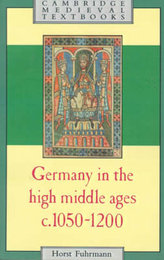
|
Germany in the High Middle Ages: c.1050-1200
Paperback / softback
Main Details
| Title |
Germany in the High Middle Ages: c.1050-1200
|
| Authors and Contributors |
By (author) Horst Fuhrmann
|
|
Translated by Timothy Reuter
|
| Series | Cambridge Medieval Textbooks |
|---|
| Physical Properties |
| Format:Paperback / softback | | Pages:220 | | Dimensions(mm): Height 217,Width 140 |
|
| Category/Genre | World history - c 500 to C 1500 |
|---|
| ISBN/Barcode |
9780521319805
|
| Classifications | Dewey:943.023 943/.023 943.02 |
|---|
| Audience | | Professional & Vocational | |
|---|
| Illustrations |
Worked examples or Exercises
|
|
Publishing Details |
| Publisher |
Cambridge University Press
|
| Imprint |
Cambridge University Press
|
| Publication Date |
9 October 1986 |
| Publication Country |
United Kingdom
|
Description
Germany in the High Middle Ages opens with a wide-ranging and yet detailed description of the conditions under which men lived and their attitudes of mind during the period 1050-1200: against this background it proceeds to analyse the fundamental Political, social, economic and cultural changes of the period in central Europe. Professor Fuhrmann considers the social transformation brought about by the emergence of new classes such as ministeriales and burghers, and examines the intellectual renewal reflected in the rise of scholasticism and the foundation of the universities. He also describes the gradual erosion of the power of the German rulers, which led to the Empire losing its position as the leading power in Europe, and yet was accompanied, by a last flowering under the Staufen emperors arid the chivalric culture with which they were closely associated. Throughout the book these changes are contrasted with contemporary developments elsewhere in Europe, especially in France, England and Italy.
Reviews'Horst Fuhrmann gives us 150 stormy years in 180 pages. his narrative is economical and lucid, though he opens with a relatively leisurely chapter on space, time and man in the Middle Ages. This masterly survey of 'medical anthropology', with its evocation of the harsh environment and alien thought-world of the period, is followed by a deft sketch of the transformation of Western Europe into something recognizably 'modern' by the year 1200.' The Times Literary Supplement 'This concise, vigorous, well-translated delineation of a short span, only a century and a half, of germany's medieval experience has the great merit of setting the events within the European context. The author succeeds in showing that Germany was not behind hand in the economic, cultural and religious advances usually attributed to french and italian society as pioneers in that age ... The book is published in hardcover and paperback, and will establish itself, by its great verve and readability, as the standard short sccount in English for some years.' History
|